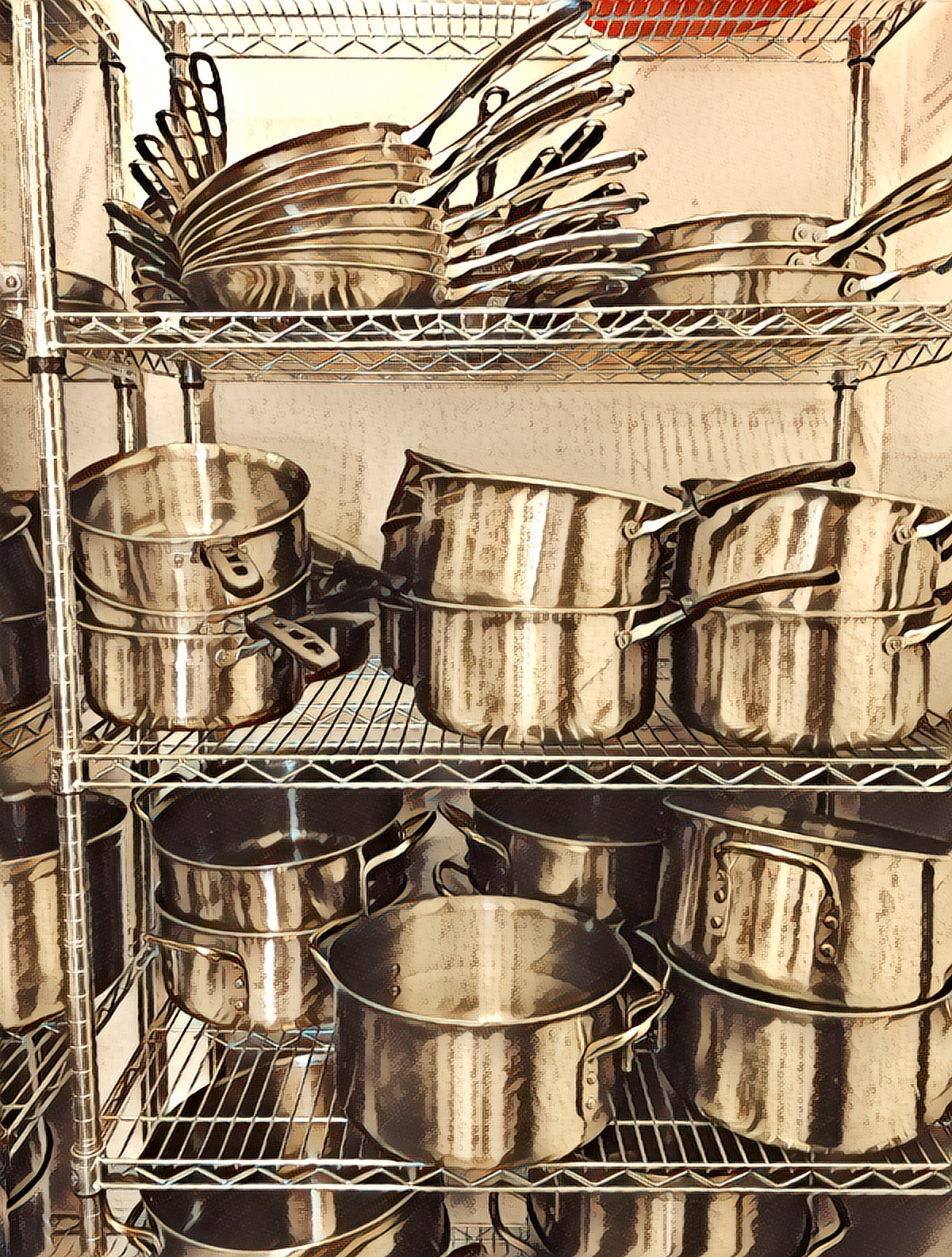
There is no one to turn on the lights, fire up the ovens, start the groan of hood exhausts, and no one to fill the dish machine tank and three bay sink. Vendor deliveries have ceased, floors remain clean and untouched, and the clock on the wall suddenly sounds off with the ticking of time. The POS printer hasn’t come to life for a week or so; there is no smell of coffee brewing, bacon fresh from the oven, sauté onions and garlic, stock, or 109 ribs being pulled from the slow cooker. Kitchens across America are asleep and waiting to be awoken.
Kitchens without cooks to bring them to life are wastelands of stainless steel. The coolers may be empty, but it won’t take much to fill the void with meats, fish, fresh produce and dairy and charge forward. Every kitchen awaits the opportunity to play their part.
As cooks we can all close our eyes and envision the smells, sounds, heat, and organized chaos that define a busy kitchen. We crave the banging of pots and pans, the staccato of knives as they strike a cutting board, the sizzle of ingredients as they hit a scorching hot pan, the clink of glasses and china, the bark of the expeditor, the banter of cooks and the spiciness of their language, and the “yes chef” response when a directive is given. A quiet kitchen just does not seem right. We miss the cases of ingredients waiting to be rotated and stored, filleting fish, kneading dough, trimming tenderloins, peeling onions, garlic and shallots, and the whir of a VitaPrep blender and Robot Coupe. These sounds and their associated smells represent our lives, our culture, and the world where we are most comfortable.
Sure we complain about the hours, the intensity of the work, the stress, the heat, and even the slow work of those who are less committed – but we miss it. A cook’s life is a sensual experience – each human sense is poked and prodded throughout the day and now that it has been taken away, we feel less whole.
Pulling a strap pan from the oven with two 109 ribs weights over 50-pounds – we miss that. Lifting a 5-gallon pot of stock from the stove, sixty or more pounds of scorching hot broth and vegetables is a dangerous act – we miss that. Flipping sauté vegetables in an 18-inch pan is an acrobatic process as the ingredients climb into the air and then gracefully tumble back in place – we miss that. The tedious process of peeling and deveining a case of U-15 shrimp is something we also miss. Peeling onions and potatoes, pulling the skins off of garlic, mincing parsley, shucking clams and oysters, portioning steaks and marking them on a cherry red grill, caramelizing Diver scallops, or salmon fillets, and plating up a few hundred covers on a Friday night – we miss all of that.
Joni Mitchell, the magical songwriter of the 60’s and 70’s once wrote: “Don’t it always seem to go, that you don’t know what you’ve got till it’s gone?” That statement sure sums things up today – doesn’t it?
We have too much time to think about what we are missing, too much uncertainty about what may come, there is too much anxiety over our own health, and far too much sadness about what is missed. We miss the camaraderie of our teammates, the stress of a sometimes-impossible job, the pressure of a full dining room and the impatience of servers waiting for their order, and the stare that could kill from the chef when we screw up an order and need to re-fire.
The first couple of days in isolation were a nice pause from the pace of everyday in the kitchen – after that, the silence and the lack of focus was, and still is, painful. Cooks need to cook, cooks need the pace of the kitchen, cooks thrive on the stress, and cooks need their kitchen back.
Know that if we act the way we need to act to stop the spread of this virus, if we remain aware that others are feeling the anxiety of being complacent and bored, and if we do whatever we can to be there for our co-workers, family, and friends – this will end and we will return to those kitchens that lie in waiting. It won’t be the same at first, but once we step through that back door, turn on the lights, fire up the ovens, and flip the switch on the exhaust fans – it will begin anew.
Patience is a virtue that Type A cooks have little of – this is something that we will need to learn. Patience and diligence will win this battle. First things first – defeat this invisible enemy, remain diligent with our new normal, learn from the experience, and return to our kitchens with a new sense of understanding.
Restaurants are important to our society, to the lifestyle that Americans have become accustomed to, and to our national economy, but know that restaurants and the life associated with working in them is important to cooks, chefs, servers, bartenders, dishwashers, vendors, farmers, fisherman, and ranchers as well. We are all feeling the darkness of a kitchen that is currently asleep.
PLAN BETTER – TRAIN HARDER
Be patient – Be diligent
Harvest America Ventures, LLC
www.harvestamericacues.com BLOG
Joni Mitchell – from Big Yellow Taxi

Leave a comment